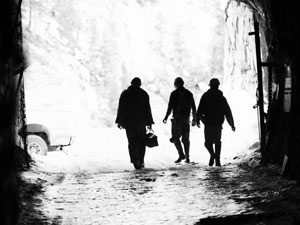
[miningmx.com] – ACCORDING to the lawyers who press the cases, the noose is ever tightening around the necks of mining companies that allegedly expose their employees, mostly underground miners, to the risk of lung disease.
“The game is up for the gold mining industry,’ says Richard Meeran, an attorney for UK firm, Leigh Day, which recently appeared the victor after Anglo American agreed to an out of court settlement paying the law firm’s clients, some 23 miners suffering silicosis, an undisclosed fee in compensation.
According to another lawyer, the independent Richard Spoor, it suited Anglo to settle; it didn’t want its defence exposed while larger large suits loom. And there are a bunch.
A class action consisting of 3,500 former miners claiming compensation after contracting silicosis – a lung disease akin to tuberculosis and often fatal – was lodged in the UK courts in September 2011. (The matter is now under appeal after the authority of UK jurisdiction was successfullly challenged.)
Spoor, meanwhile, has 22,000 applications from silicosis sufferers in his class action. There’s also a filing in the Pretoria High Court for 60 individual cases underway while in the Johannesburg High Court another class action representing 31 cases of silicosis sufferers, allegedly contracted while working at Anglo American’s Vaal Reefs (while Anglo had a gold and uranium division which subsequently became AngloGold), is being filed.
According to the Legal Resources Centre which has also helped pioneer redress against the health risks to which mining companies exposed their workers, there’s a pool of some 280,000 people who worked on gold mines for longer than 10 years – the time allowed to contract silicosis – in potential suits. According to some studies, between 20% to 30% of all gold mine workers contract silicosis.
Nailing mining companies in this way is a budding industry. “The lawyers do pretty well out of this,’ says a corporate source. “These are not pro bono cases; the firms dedicate the lawyers full-time to chasing down these cases over long periods of time (10 years in the case of Anglo’s recent settlement).’
Spoor responds that Anglo, and the corporate world in general, is the more cynical. “It suits Anglo to drag out these cases,’ he says. About a third of the 23 claimants with which Anglo settled recently in the matter Leigh Day was fighting, had died since the case began.
The fact of the matter is that South African mining is behind the eight ball, although not all litigation succeeds. After about a decade of attempted prosecution, the Apartheid reparations case against Gold Fields, as well as other industrial firms such as General Motors which supplied automotive parts used in raids on activists, petered out last month. (Although in 2012, GM did offer $1.5m to the claimants in the Khulumani Group, a fee paid in shares as it muddled through bankruptcy proceedings).
Other cases thrive, however. Spoor says he is targeting Sasol, the petrochemical firm, for having exposed its coal workers to the hazards of pneumoconiosis or “black lung disease’ as it is more graphically described. Sasol spokesperson, Alex Anderson, confirms a “preliminary meeting has been held’ with Spoor.
“I’ve got a good relationship with Sasol but it is very sensitive to reputational risks so it’s a good place to start,’ says Spoor who hopes that a settlement with Sasol can be the basis for broadening class action suits to the entire coal mining industry in South Africa.
v
Manganism is another form of lung disease specific to the manganese mining industry. Spoor says he’s “working with’ African Rainbow Minerals (ARM) on alleged infection of workers at the Cato Ridge facilities of Assmang, in which ARM is a joint venture partner. This matter seems to be gaining particular traction.
In the wake of the Anglo settlement, Meeran has suggested that the mining industry establish an industry-wide scheme to settle claims in a way that reduces the waiting times, the tedious pre-court battles.
As yet, South African courts have yet to determine a single case of silicosis infection although in 2011, the Constitutional Court did rule in favour of former Vaal Reefs underground miner Thebekile Mankayi which it said was allowed to sue his employer outside of health legislation which would otherwise serve to reduce the employer liability.
“At the moment, this is all in the court of public opinion,’ says Spoor. “There is no legal precedent we can work with. But the settlement made by Anglo doesn’t reflect well on the company. It suggests there is a case to be made,’ he says.











